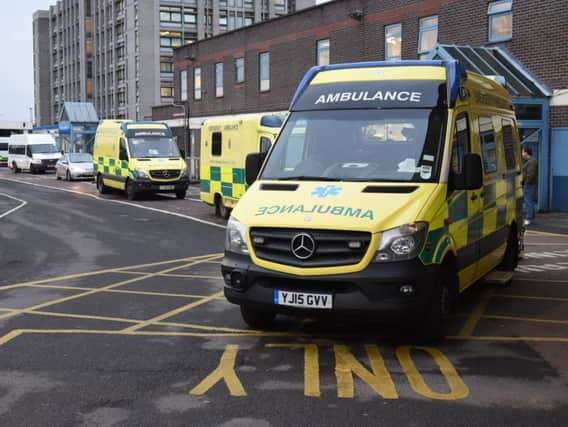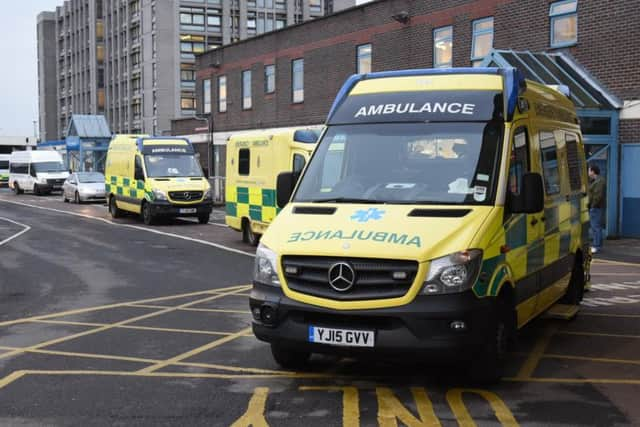Compensation claims more than double at Doncaster hospitals


Figures obtained by the Doncaster Free Press show that payouts and legal costs resulting from actions against Doncaster and Bassetlaw Teaching Hospitals Trust totalled £50,962,291 over the five year period from 2012/13 to 2016/17.
And the number of compensation claims made during the most recent financial year have more than doubled compared to the previous year.


Advertisement
Hide AdAdvertisement
Hide AdBosses at the hospital are unable to explain the rise, but say the increase is lower than the figure nationally, and not all those claims made in the latest figures will be successfully fought.
Hospital figures from the 2015/16 financial year revealed 52 claims were made, while in 2016/17 they stood at 107 up until February, when there was still one month of the year left to go.
January saw claims made under the Clinical Negligence Scheme for Trusts soar to 28. December had seen 27 claims,
It also saw a spike in numbers in June 2017
Mr Sewa Singh, medical director at the trust, said: “Although there has been a rise in claims across the whole NHS, this has been less so for our trust.
Advertisement
Hide AdAdvertisement
Hide Ad“While there was a brief increase in the number of claims the trust received in December and January, in February we received considerably less, with just five cases. There is great variation in the claims we receive from month-to-month, and it is important to note that not all of these claims are successful.
“We continue to work with NHS Resolution and our solicitors to fully investigate and assess all claims, ensuring that lessons learnt are shared with staff so we can continually improve the care we deliver for our patients.”
Bosses say from the information they have received, there was no one particular reason for the increase.
The rate of claims being made does not necessarily match the rate of those that are successful. Many claims start with a perceived issue, which is then assessed and investigated. If it goes any further than this there will be a defence put forward by the trust, or it may be settled if there has been negligence, or if there is a lack of evidence to defend the case.
Advertisement
Hide AdAdvertisement
Hide AdThe rates reported vary and can take three years or longer to sort out, so bosses say this needs to be seen over time rather than assume that there is a distinct change.
The trust pays an insurance premium against compensation claims, something which it says has been lessening over the past three years and is much lower than many other acute NHS trusts.
Compensation costs last year, 2017-17, showed a fall on the previous year to £8.86m. It compared to £11.5m in 2015/16, £6.8m in 2014/15, £10.8m in 2013/14, £12.9m in 2012/13. The figures include both legal costs and any payouts.
Earlier this year, it was revealed that millions of pounds in compensation was being paid out every year to people harmed by medical blunders which happened at NHS hospitals more than two decades ago.
Advertisement
Hide AdAdvertisement
Hide AdIn the past five years more than £152m has been paid out by the Department of Health to settle negligence claims after mistakes which were made before April 1995 at NHS trusts across England.
For historical negligence claims, dating back to pre-1995 the highest amount paid out in Yorkshire was following errors at Bradford Teaching Hospitals NHS Foundation Trust, at more than £8.4m.
But the second highest figure for historical payouts in the county was Doncaster and Bassetlaw NHS Foundation Trust, at £8.1m.
Medical director Mr Singh said: “The costs are mainly due to a small number of high value historical cases from before April 1995 related to our three main sites, before re-organisation into an NHS Foundation Trust in 2004.”
Advertisement
Hide AdAdvertisement
Hide AdMeasures planned by the Department of Health to rein in the costs include a cap on legal fees recouped by law firms and cash incentives to make maternity services safer.
A Department of Health spokesperson said: “Our relentless drive to improve patient safety, including an ambition to halve the rates of neonatal deaths, '¨stillbirths, maternal deaths and brain injuries caused during or shortly after labour by 2025, will help to reduce traumatic and costly safety failings in the NHS and ensure better protection for patients.”